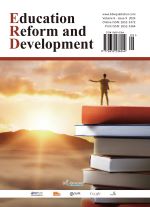Abstract
“14th Five-Year Plan” period is the first five years to the second century goal, but also the key period for the development of children’s health cause. “Healthy China 2030” plan outline “clearly put forward the implementation of healthy children plan [1]. Although the national level attaches great importance to children’s health, there are still many factors that affect children’s healthy growth in daily life, such as various diseases in children’s physical health, developmental delays in various physiological functions, insufficient exercise ability, obesity, etc., as well as mental health problems such as stuttering, night terrors, fear, anxiety, rage, lying, autism and hyperactivity. To solve these problems, not only the attention and deployment of the country and the government, but also the understanding and cooperation at the social level and the family level, in order to better promote the healthy growth of children under the joint efforts of everyone. The “1+1+1” “Body intelligence” curriculum system research includes a healthy child’s physical development system, a healthy child’s psychological (mental) development system, and a healthy child’s ability development system. Aiming at the problems of physical and mental development and ability development in the healthy growth of children, service programs are scientifically and rationally formulated, and implemented from the social level and family level to effectively improve children’s health level [2].
References
Anonymous, 2019, On the Healthy Children Action Plan (2018–2020). Mother and Child Health, (9): 5.
Li H, 2019, The Construction of the Curriculum System of “Physical Intelligence” for Preschool Education Majors in the New Era. The Comparative Research on Cultural Innovation, 2019(1): 2.
Wang J, 2021, Contemporary Research on Children’s Physical Health and Sports Education Development: Review of Children’s Sports and Health. School Health in China, 42(3): F0002.
Peng D, Mao Q, Liang W, et al., 2022, Scientific Research Contributes to the Healthy China Initiative. Healthy China Observation, 2022(8): 72–75.
Chen B, 2019, Analysis of Children’s Mental Health Education Strategies under the New Situation. Curriculum Education Research: Study of Xuefa Teaching Method, 2019(13): 42.
Zhang H, 2014, Fostering Children’s Innovative Consciousness and Ability under the Framework of Comprehensive Quality and Ability Development. Science and Education Guide, 2014(15).
Liu H, 2017, Infant Body Intelligence to Explore Teaching Mode. Journal of Quality Education in the West, 3(2): 2.
Lai Z, 2021, Research on the Model Construction of Children’s Physical Intelligence Training and Physical Fitness Evaluation System. Sports and Leisure: Mass Sports, 2021(8): 61.
Hu X, Zhang K, 2014, Discussion on the Stage Evaluation Criteria of Physical Development of Preschool Children (2–6 Years Old). Proceedings of the Third National Fitness Science Conference, China.
Li Y, 2022, Research on the Practice of Physical Fitness Games to Promote Children’s Physical and Mental Health Development. Sports Vision, 2022(16): 71–73.
Fu H, 2022, Research on the Teaching Reform of Preschool Children’s Psychological Development Course Toward Practice: A Case Study of Guangxi Preschool Teachers College. Guangxi Education C (Vocational and Higher Education Edition), 2022(4): 141–144.
Guo L, Xu B, Li L, 2024, The Role of Games in Promoting Children’s Psychological Development. Psychological Science, 2024(6): 749–751.
Mao B, 2024, Investigation and Training of Sensory Integration Ability in 4–6 Year Old Children, thesis, Shanxi Normal University.
Huang X, 2021, On the Influence of Sensory Integration on Child Behavioral Development. Students, Parents, Society (School Education), 2021(3): 35–37.
Li R, 2015, Introduction to Education on Children’s Comprehensive Ability to Enhance the Influence. Journal of Education, 2015(28): 6.
